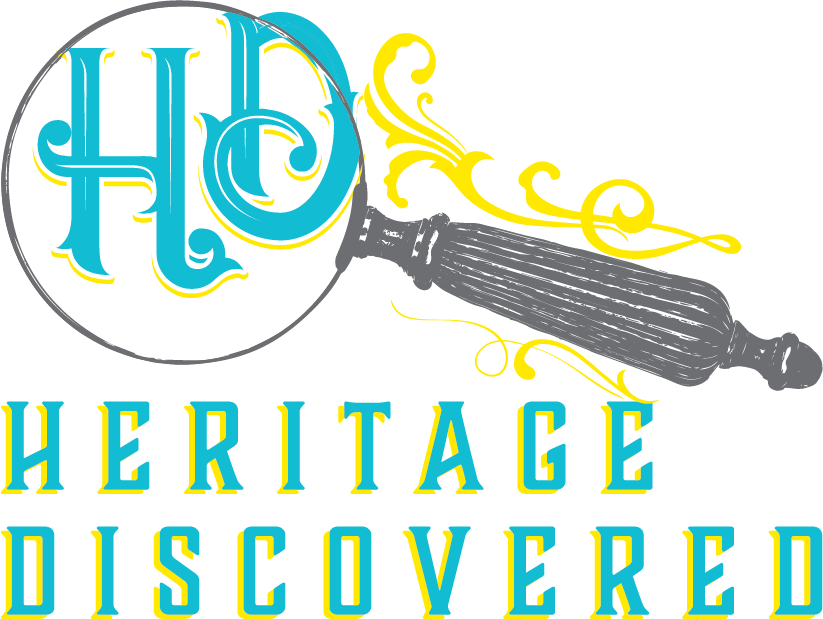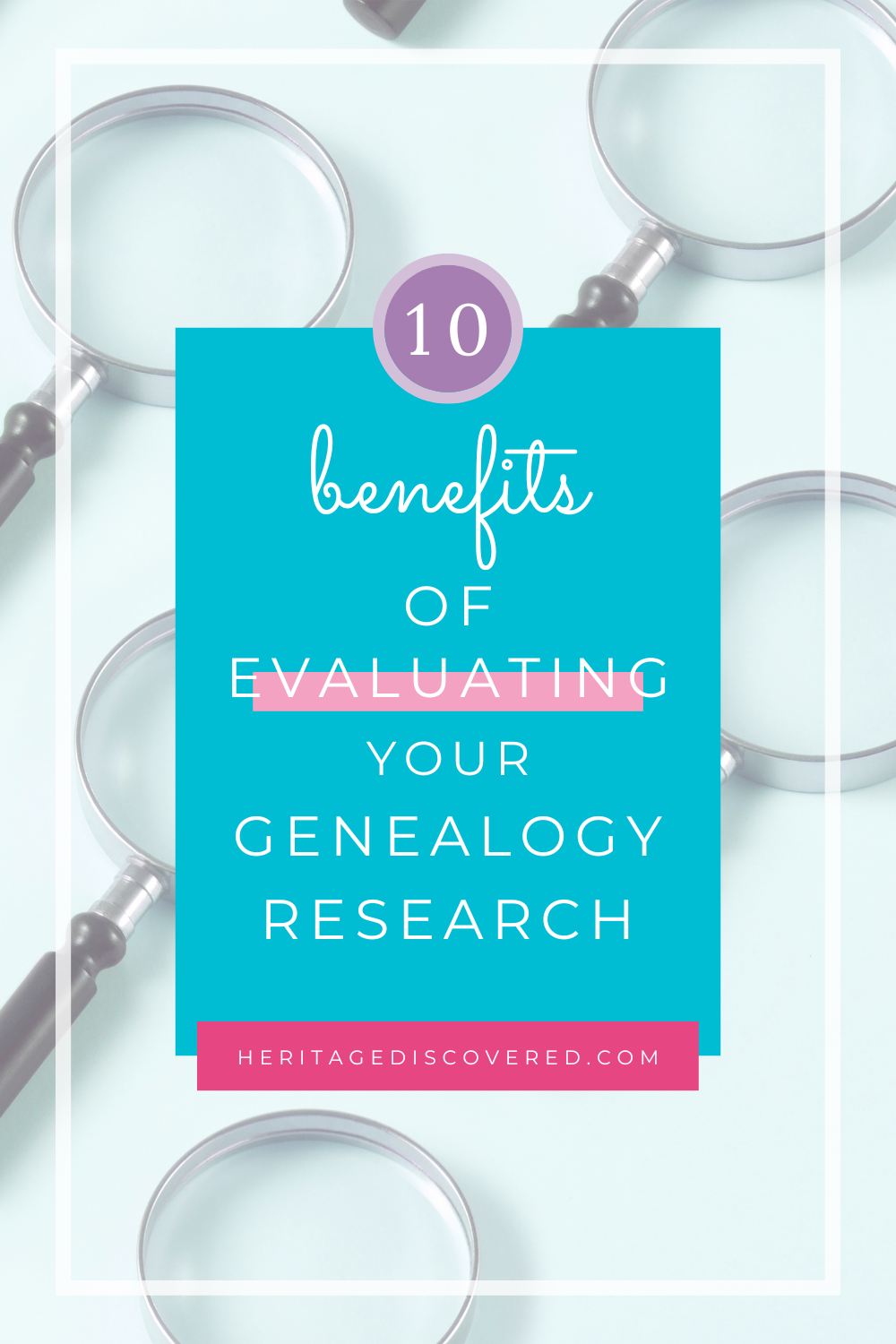Analyzing Evidence: 10 Benefits Of Evaluating Your Genealogy Research
*This post may have affiliate links, which means I may receive commissions if you choose to purchase through links I provide (at no extra cost to you). All opinions remain my own.
Becoming a good genealogist takes time and moving beyond the “hatched, matched, and dispatched” method of collecting ancestors.
Now don’t get me wrong, I started my genealogy research journey as an ancestor collector.
But now I’m much more interested in uncovering more about my ancestors’ lives than adding more generations to my tree with only basic details.
Discovering our ancestors in records is always thrilling – but that’s only the beginning! We have to dig deeper and consider if the information we’ve gathered is accurate and answers our research questions. We do this by evidence evaluation.
Analyzing your research is invaluable for getting a deeper understanding of our ancestors’ story – and our own story.
Analysis isn’t a linear or one-and-done process. Every time we unearth a new piece of information about our family, we must weigh it against everything else we already know.
Although it may not feel like it comes naturally, analysis is a skill that anyone can learn. As you get more practiced with it, you’ll likely automatically evaluate each source and piece of evidence as you come upon them. You’re probably already interpreting records to some degree without even realizing it.
In this article, I share 10 benefits of analyzing your genealogy research.
Related posts:
How To Avoid A Brick Wall And Research Your Ancestors With Common Names
Why Isn’t My Ancestor in the Census?
How To Use Online Family Trees The Right Way
How To Solve Your Genealogy Brick Wall With Surname Research
Challenges with evaluating evidence in genealogy research
Although assessing genealogical evidence is crucial, some situations can make it more difficult.
Challenges like:
The handwriting is hard to read. What on earth does it say?
People gave incorrect information on purpose. AKA they lied.
People also accidentally gave untrue information.
Inconsistent – or nonexistent – recordkeeping. Keeping records wasn’t as vital in some time periods and places as today.
Inconsistent spelling. Like records, spelling wasn’t as important or consistent as nowadays.
Name changes. People could change their names just a little or enough to make you wonder if you are tracing the right person at all.
Unclear relationships between people. For example, early censuses only list people in the house but their relationships to each other. [A situation like this led me to believe that my 3x great grandparents had way more children than they did. The extra kids were his sister’s, who lived next door.]
Family stories that may or may not be entirely true.
Challenges like these can lead us to follow the wrong path and research the wrong people. No one wants to have to remove “former ancestors” from their tree, right?
Related posts:
Solve Your Genealogy Brick Wall: Review and Analyze Your Research
Solve Your Genealogy Brick Wall: How To Evaluate Your Sources
Solve Your Genealogy Brick Wall: 10 Ways To Widen Your Research Net
How and Why to Research Your Collateral Ancestors
Why analyzing evidence is essential to your genealogy research
Evaluating evidence is so important to ensure you don’t “bark up the wrong tree” and add flawed information to your family history. It also helps you avoid missing clues that may create research brick walls.
There are many types of sources which can provide useful information when piecing together our family history, like:
By taking the time to examine what we find in these sources for clues, we gain so much more than birth, marriage, and death information.
Collecting records is not enough. You must be able to grasp what the record says, how it relates to your research problem, and whether you should believe the information. This is where evaluation of evidence enters the process.
Here are 10 benefits of analyzing evidence from your genealogy research:
1) Understand the source. Sources are one of the most significant reasons to consider evidence. By understanding the source, you can deduce what information you can gain from it, like what information should be there but isn’t.
2) Understand the informant. Did they truly witness the information they provided? Did they have a reason to fudge the truth? Can you even tell who gave the information?
3) Comprehend the information in the source. Clues can be wrong. They can contradict clues from other sources. Information can be left out or misunderstood. People could have intentionally or unintentionally given wrong information.
Evaluating information can be challenging, but it’s essential. Evidence isn’t beneficial if you can’t make an informed decision about its correctness and reliability.
4) Know if it answers your research question. And if so, with what kind of genealogical evidence (direct, indirect, or negative)?
5) Know when you have enough evidence to prove the fact you were researching. The first step of the Genealogical Proof Standard (GPS) is reasonably exhaustive research.
Because evidence leads to our conclusions, to know if you have enough evidence to prove a point, you must gauge what you have collected.
““Research, evidence, citation, and analysis are inseparable. Evidence is the vehicle that moves our research from curiosity to reality. Citation and analysis are the twin highways that get us there, smoothly and safely.” ”
6) Avoid bias and assumptions. Theories can help to guide our research, but assumptions and biases can lead us astray.
Of course, we don’t want to think that our ancestors lied about their age to enlist in the military (or avoid it) or made themselves younger to attract suitors. But if we assume that everything we find is correct, we could be missing clues that lead to the true information we need.
By objectively thinking about the genealogy evidence we have, we can ensure that we are following the right trail and the right person.
7) Resolve conflicting information. We’re going to have evidence that contradicts other information. It’s a fact of life in genealogy research.
Going back to the GPS, steps four and five are to resolve any conflicting information and arrive at a well-reasoned written conclusion. We can’t resolve contradictory information or come to a conclusion without the skill of genealogy analysis.
When you study the source, informant, and information, you can understand what is more or less reliable. This can lead you to more trustworthy sources to untangle conflicting information.
For example, if someone’s age is different on almost every document, reviewing all the sources and evidence will help you determine the likely birth year range or year.
8) Avoid misinterpreting evidence. Misinterpretations can lead to wrong conclusions about relationships, events, or information like whether someone was a veteran.
For example, if a person’s age on a tax list is misunderstood, it could result in believing incorrect information about their life and relationships that could lead you to research the wrong ancestor.
9) Identify patterns in the evidence. Genealogical analysis is a valuable tool for detecting patterns in the information you’ve found. By taking the time to appraise what you discover, you can see correlations between people and events. this can help you sort out research challenges like people with common names.
10) Find more records. I know I’m not the only one who wants more records about my family. Evaluating your research can reveal details that were previously overlooked and lead you to sources that you hadn’t considered.
The correlation of facts done while scrutinizing your research also can guide you to more records with more clues.
Related posts:
6 Common Genealogy Mistakes And How To Avoid Them
Why Local History Books Are More Important Than You Think For Genealogy
10 Great Resources For Finding Your Ancestor’s School Records
Final thoughts
Genealogy is a journey down the path of our family stories, and examining evidence is an essential step on this path.
By considering the evidence we collect and challenging ourselves to delve deeper, we can put together a more accurate picture of our family’s past.
Though there are challenges to dissecting evidence, there are also rewards, like enriching our understanding of our ancestors' and avoiding time-wasting mistakes.
We can elevate our research by mastering the skill of analyzing evidence. Analysis of evidence can feel challenging at first, but with practice, it becomes second nature!


